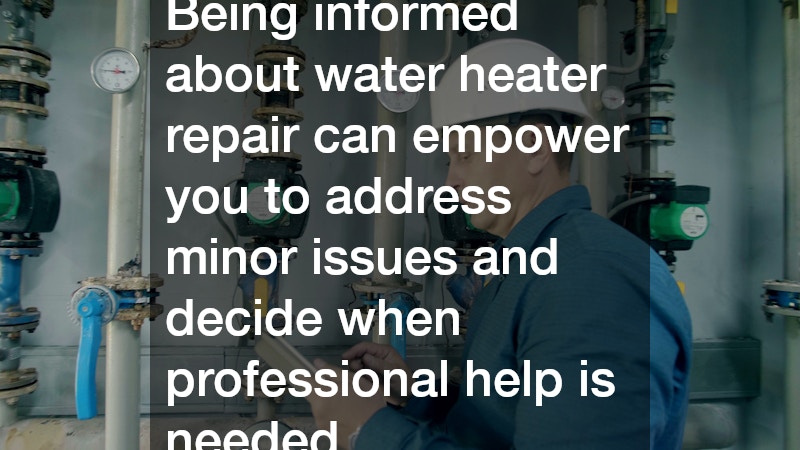What You Need to Know About Water Heater Repair
The water heater is an indispensable appliance in modern homes, providing the comfort of hot water for various applications. However, like any home appliance, water heaters require regular maintenance and can sometimes run into issues. Understanding the basics of water heater repair can help you save money and extend the life of your appliance.
1. How Do I Know If My Water Heater Needs Repair?
1.1 Common Signs of Water Heater Problems
Unusual noises like rumbling or popping can indicate sediment buildup, which might necessitate professional attention. Leaks around the base of the water heater are another telltale sign that something is amiss, often pointing to a potentially serious problem.
Inconsistent water temperature, such as water being too hot or not getting hot enough, can also suggest a malfunctioning thermostat or heating element requiring repair.
Identifying problems early can prevent costly repairs and extend the lifespan of the water heater. Neglecting these common signs may lead to more severe issues, including complete system failure or significant water damage. Early detection and intervention are key to maintaining an efficient and effective water heater.
If you notice any of these issues, it might be time to call in a professional for a diagnosis. Skilled technicians can quickly identify the problem and recommend the appropriate solution. Addressing these signs early not only saves money but also ensures the continued comfort of having hot water in your home.
1.2 Checking Water Heater Age and Usage
The age of your water heater can significantly impact its performance and likelihood of needing repairs. Most water heaters have a lifespan of about 8 to 12 years; if your appliance is nearing this age, replacement might be a wiser investment than repair. Checking the label on the water heater can provide you with the manufacturing date and help you estimate its age.
Usage levels also affect the longevity and wear on your water heater. Heavily used systems may experience more frequent issues due to constant heating cycles and greater sediment buildup. Evaluating the average usage can help determine whether a repair is justified or if it’s time for an upgrade.
1.3 Performing a Basic Inspection
Conducting a basic inspection of your water heater can help you identify visible issues that may need professional repair. Start by checking for any evident leaks around the tank and connections, which can be a serious problem. Also, look for signs of corrosion or rust, indicating the potential for leaks and inefficiencies.
Next, inspect the pressure relief valve and around the anode rod, as these components are crucial for maintaining your water heater’s functionality. A corroded or malfunctioning anode rod can lead to rust and deterioration of the tank. Performing these visual inspections routinely can help you catch problems early and address them before they escalate.
2. Can I Repair My Water Heater Myself?
2.1 Safety Precautions and Tools Needed
Before attempting any water heater repair, it is vital to prioritize safety, which includes turning off the power supply and water supply to the heater. Electric water heaters should be disconnected from the circuit breaker, while gas heaters require closing the gas valve to prevent accidents. Equipping yourself with the right tools, such as a multimeter for electrical testing, is essential for safe and effective repairs.
Other necessary tools might include a screwdriver, wrench, and a hose for draining water from the tank. Additionally, wearing protective gear such as gloves and safety goggles can prevent injury while working on your water heater. Being prepared with the right tools and safety measures can enable successful and safe DIY repairs.
2.2 Common DIY Repairs and Fixes
Simple repairs such as replacing a faulty heating element or thermostat can sometimes be managed by homeowners. These components are often the cause of temperature inconsistencies and can be replaced with basic guidance from a reliable source or manual. If you feel comfortable with tool usage and electrical safety, these tasks can offer a cost-effective solution to common water heater problems.
Another common fix is draining and flushing the tank to remove sediment buildup. This routine maintenance can improve the efficiency and lifespan of the heater, preventing more significant issues in the future. Ensuring that the power and water are turned off during this process is crucial for safe completion.
2.3 Knowing When to Call a Professional
Complex repairs involving gas lines, significant electrical components, or extensive plumbing should always be handled by a qualified technician. Professionals possess the expertise and equipment necessary to address complicated issues safely and effectively. Attempting such repairs without adequate knowledge can lead to accidents, further damage, and higher repair costs.
If you have attempted a DIY fix but the problem persists or worsens, it is wise to seek professional assistance. Technicians can provide a comprehensive diagnosis and identify less apparent issues that could be contributing to the problem. Professional help ensures that repairs are conducted to standard, maintaining the safety and function of your water heater.
The risks of DIY repairs should not be underestimated; professional technicians are equipped with the knowledge to tackle even the most challenging water heater problems. Balancing confidence with caution ensures your water heater’s longevity and efficiency. Trust in professional expertise when in doubt, safeguarding both your appliance and household.
Being informed about water heater repair can empower you to address minor issues and decide when professional help is needed, helping you maintain an efficient, long-lasting water heater. Regular maintenance and timely repairs can not only improve the performance of your water heater but also ensure safety and comfort in your home. Equip yourself with knowledge and tools to manage basic care, and always seek professional guidance when necessary, ensuring that your water heater remains a dependable asset.




